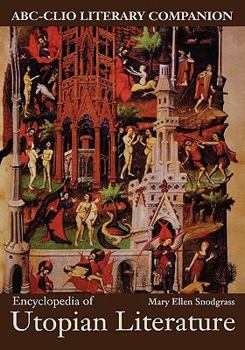Encyclopedia of Utopian Literature
Select Format
Select Condition 
Book Overview
Offers brief summaries of utopian novels, discusses concepts related to utopias and dystopias, and offers profiles of utopian writers.
Format:Hardcover
Language:English
ISBN:0874367573
ISBN13:9780874367577
Release Date:June 1995
Publisher:ABC-CLIO
Length:644 Pages
Weight:0.05 lbs.
Dimensions:2.1" x 7.3" x 10.3"
Age Range:14 years and up
Grade Range:Grade 9 and higher
Customer Reviews
1 rating
Good, though not comprehensive
Published by Thriftbooks.com User , 18 years ago
A one-person "encyclopedia" is always a risky proposition, and Snodgrass carries this one off fairly well overall. There seems to be more cross-referencing than is strictly necessary, and even this isn't 100% consistent (certain characters from major literary works get their own entries, while others are passed over a given a "see [major literary work]"). Of course there are going to be some oversights, and she does openly state that she had to draw the line between utopian and sci-fi/fantasy somewhere. Thus her omission of several significant works of social-science fiction (including Harrison's "Make Room! Make Room!", the inspiration for the film Soylent Green) is understandable, I guess, though she also chooses to include some of the other biggies (like A Clockwork Orange). My biggest cause for concern was the summaries: after reading a few about works I have read, it made me a bit anxious about how much to rely on the summaries for works I haven't read. Snodgrass's summary of The Handmaid's Tale, for instance, is rather uneven, focusing on relatively trivial moments ("the Handmaid cowers in the closet as she suppresses hysteria") while passing over major plot points, and flatly misstates the ending. There is also NO entry for socialism (though there is a brief one for communism, as well as for broad religious terms like "Heaven" and "Hell"). This book is a good starting point for those wishing to learn (or teach) about broad utopia concepts and be introduced to seminal works, but it's far from a complete work.






